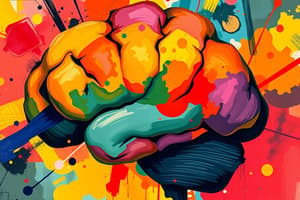Podcast
Questions and Answers
What is the primary focus of attribution theory?
What is the primary focus of attribution theory?
- Developing strategies for navigating social relationships
- Analyzing the role of ability in achieving success
- Understanding the impact of emotions on behavior
- Explaining how people make causal attributions for behaviors and emotions (correct)
What do people traditionally attribute success to?
What do people traditionally attribute success to?
- Low ability and laziness
- Emotional intelligence and luck
- Social acceptance and wealth
- High ability and hard work (correct)
What is suggested to be a fundamental aspect of human brains?
What is suggested to be a fundamental aspect of human brains?
- Emotional regulation
- Creative thinking
- Predictive machines (correct)
- Logical reasoning
What is the outcome of making causal attributions, according to the text?
What is the outcome of making causal attributions, according to the text?
What is the implied relationship between attributions and behavior, according to the text?
What is the implied relationship between attributions and behavior, according to the text?
What is the attributional dimension that refers to whether a person can control the outcome?
What is the attributional dimension that refers to whether a person can control the outcome?
According to the expectancy change theory, which type of attributions are more likely to lead to success following success?
According to the expectancy change theory, which type of attributions are more likely to lead to success following success?
What is the term for the tendency to underestimate the role of situational factors in others' behavior and overestimate the role of personal factors in our own behavior?
What is the term for the tendency to underestimate the role of situational factors in others' behavior and overestimate the role of personal factors in our own behavior?
What is the name of the theory that suggests that our emotional responses to an outcome are influenced by the attributions we make about the outcome?
What is the name of the theory that suggests that our emotional responses to an outcome are influenced by the attributions we make about the outcome?
What is the term for the tendency to believe that a chance event is more likely to happen following a series of consecutive events?
What is the term for the tendency to believe that a chance event is more likely to happen following a series of consecutive events?
What is the attributional dimension that refers to whether the outcome is specific to a particular situation or is a general pattern?
What is the attributional dimension that refers to whether the outcome is specific to a particular situation or is a general pattern?
Flashcards are hidden until you start studying
Study Notes
Attribution Theory
- Attribution theory explains how people make causal attributions, experience emotions, and exhibit related behaviors.
- People make attributions in systematic ways to navigate the world.
- Brains are predictive machines, and attributions influence how we explain behavior and emotions.
Attributions in Achievement Domains
- Success is traditionally attributed to high ability and hard work, while failure is attributed to low ability and lack of effort.
- This pattern applies to wealth vs. poverty and social acceptance vs. rejection.
- People tend to discount situational causes in others but accentuate them for themselves.
Attributional Dimensions
- Locus: Personal/internal vs. Situational/external
- Stability: Stable vs. Fluctuating/unstable
- Controllability: Can the person control it?
- Intentionality: Is the person doing something intentionally?
- Globality: Is it the same for everyone/every situation, or just me?
Levels of Aspirations
- Typical shifts: Aspirations increase following goal achievement, decrease following goal failure.
- Expectations are influenced by past performances, leading to changes in aspirations.
Chance and Expectancy Change
- Atypical shifts: Gambler's fallacy, Negative recency effect
- Expectancy change is governed by perceived control over the outcome, influenced by stability and controllability.
Internal/Personal vs. External Attributions
- Internal attributions: Success leads to success, Failure leads to more failure
- External attributions: Predict atypical shifts, Success can be followed by failure, Failure can be followed by success
Infidelity and the Actor-Observer Effect
- People judge their partner's behavior more harshly than their own behavior.
- Actor-observer effect: More situational attributions for oneself, more personal and internal attributions for others.
Emotional Responses and Attributions
- Emotional response changes as a function of the attribution, not the situation.
- Expectance/value theory: Emotional responses vary based on attributions, such as good luck, hard work, or gift.
Studying That Suits You
Use AI to generate personalized quizzes and flashcards to suit your learning preferences.




